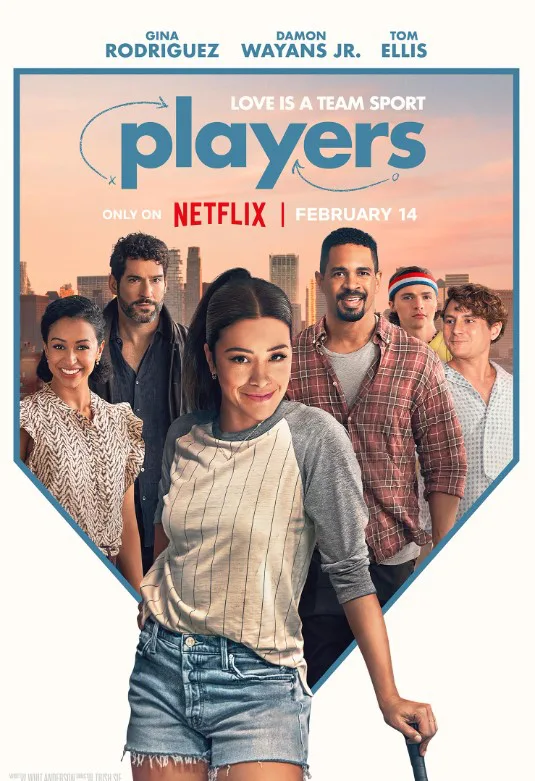In rom-com land, people get into all kinds of trouble pretending to be something they're not. They try on new personalities. They speak in weird accents. They plot and plan and connive. Sometimes these tropes work. Tony Curtis pretending he's a millionaire in "Some Like It Hot" in order to attract Marilyn Monroe. Classic. There's a reason these tropes are used so often. They work. But when it's empty, or when the main characters don't generate audience sympathy, these tropes fall apart. "Players," written by Whit Anderson and directed by Trish Sie, struggles with the inherent artificiality of its setup. The tropes are so front and center that real life barely has any room to breathe.
"Players" is about a gang of friends living in New York City, all single, all of whom spend their off-hours "running plays" on potential hook-ups. They name all the different plays ("The Betsy Ross," "Drip Drop"), and work them together, tag-teaming around their unsuspecting prey. These plays are sometimes very elaborate, but they usually work. It's a lot more fun than swiping right.
Mack (Gina Rodriguez) is queen of the players. She's a sportswriter at an unbelievably unrealistic newspaper, and sees everything through the lens of sports. Her best pals are Adam (Damon Wayans Jr.), Sam (Augustus Prew) and Little (Joel Courtney), Sam's younger brother. They meet up in bars after hours and "run plays", but the routine is getting a little old. Mack thinks it's time she had a real adult relationship. And she knows who she wants: a famous war journalist named Nick (Tom Ellis), whom she already slept with, unfortunately. This is a quandary: How do you go from a hook-up to a relationship? Mack and friends put together the most intricate play ever played in order to mastermind the segue to romantic relationship, even though the more mature Adam has his doubts. "You can't build a relationship from a play!" he tells Mack.
The main problem with "Players" is that it's so obvious Nick isn't "the one" for Mack. Adam is "the one". The rest of the movie is us waiting for Mack to get it. Nick is fine. He's maybe a little self-involved, but he is in the process of finishing a book. Of course he's distracted. The red flags aren't extreme. But still, it's hard to know what Mack actually sees in him, or what she's even looking for. She doesn't seem particularly status-conscious, although she is in awe of Nick. Her parents, now dead, were madly in love with each other. She wants that for herself. But does she? And could she have what her parents had with Nick? It's debatable.
Little tidbits are thrown into the mix, clearly set ups for a payoff later. Mack has been procrastinating on writing a huge feature. (What kind of newspaper is this, where you can procrastinate for months at a time?) Mack puts Nick's writing on a pedestal: he reports from Syria, he was nominated for a Pulitzer! She's insecure about her own writing compared to his. The sub-plot having to do with Mack's feature, Nick's involvement in it, and its eventual resolution, can be seen coming from ten miles away.
Despite the plot's creaky machinations, the cast creates a believable sense of camaraderie and there are some truly loony sequences, where they go undercover, talking into headsets like Secret Service men, and even putting on disguises as they stalk Nick around the city, running their play for Mack. Rodriguez is a refreshing presence, and she makes Mack make sense. Mack is strong but flawed, independent but insecure. People in real life often have these contradictory qualities, but it's not common in rom-coms, particularly in a rom-com heroine. It's a welcome change. Liza Koshy plays Ashley, an administrative assistant at the newspaper, who gets roped into "running the play," quickly becoming one of the most enthusiastic participants. Koshy shows the makings of a true comedienne. Watch her react to things in the background, even in scenes where she's not the focus. Whatever is going on with her is always funny. Wayans is a believable underdog leading man. Ego Nwodim is also good as Claire, a woman Adam starts to date at one point, causing ripples of alarm through the codependent band of tricksters.
Some elements in "Players" are head-scratchers. The group of friends went to high school together, and now they are all in their late 20s, early 30s, working at the same newspaper in New York City? How does that happen? The film's presentation of working at a newspaper is so out of date as to be actually tragic, in light of the hellscape that is today's media world. The office space looks like the headquarters of an internet startup circa 1998, a huge warehouse space with tall windows. Mack covers "local sports" for the paper, but in the world of "Players" this means she is actually paid money — a salary, no less — to cover ping pong matches. There is a vague fear of layoffs, but everyone seems so confident and secure in their jobs it's like a sci-fi movie.
Rom-coms are now few and far between, and the ones that show up lack charm. You can't have a rom-com without charm! People still need love stories. They yearn for them. Why have we lost confidence in telling them? "Players" doesn't work as a romance, and that's a problem since it's the whole plot. Where "Players" is fun is in the slapstick shenanigans of the group: Ashley's gung-ho attitude, Sam and Little's bickering, Adam's dry funny asides. But the whole thing doesn't hang together. "Players" feels a little bit played out.
On Netflix now.




















